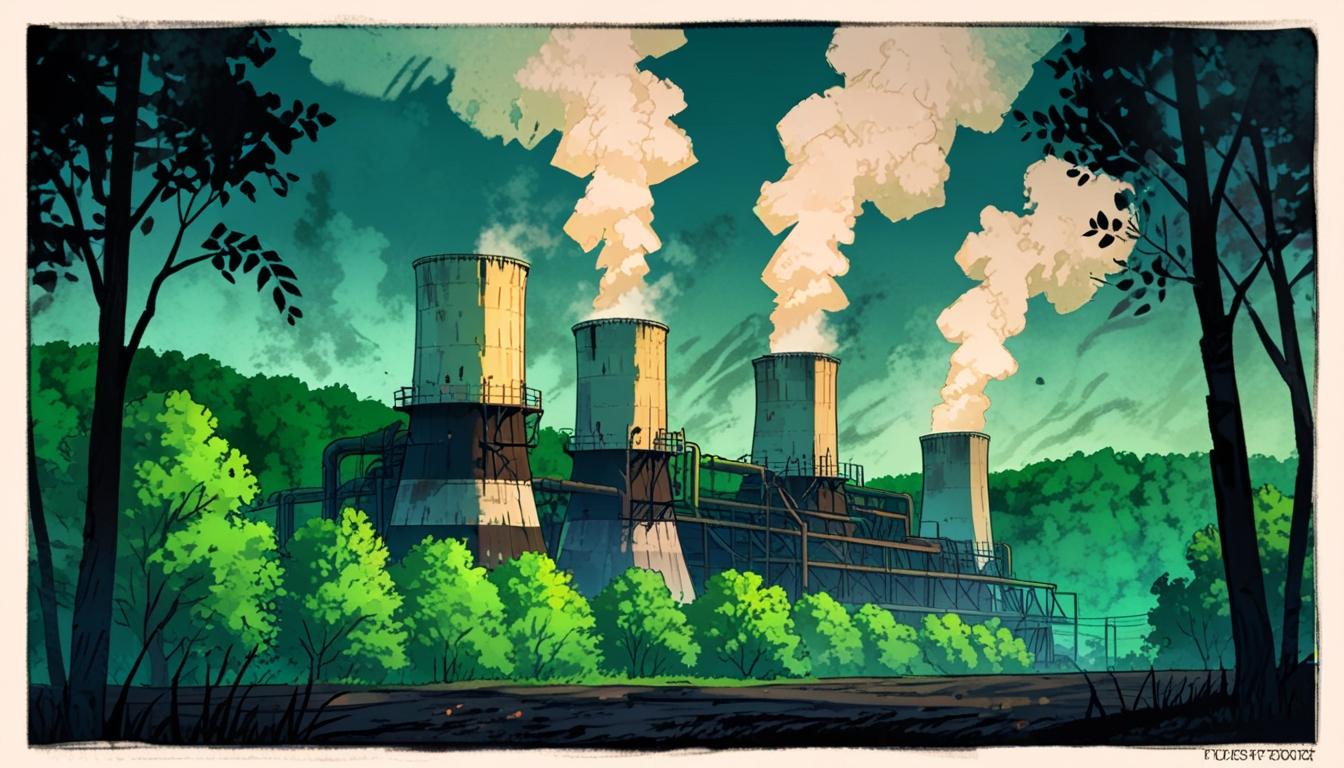Since taking office in 2025, the Trump administration has implemented extensive rollbacks on climate protections, revived fossil fuel industries, reduced funding for renewable energy, and withdrawn the US from key international climate agreements, profoundly affecting both domestic and global environmental efforts.
Since taking office on January 20, 2025, the new Trump administration has implemented sweeping changes that have significantly altered the United States’ position and actions in the global effort to combat climate change. These measures range from policy reversals and regulatory rollbacks to the dismissal of thousands of federal employees involved in climate science and environmental protection, leading to profound implications for domestic and international climate policy.
Among the most notable actions, President Donald Trump declared a “national energy emergency” on Inauguration Day. This proclamation facilitated the reversal of numerous environmental protections introduced under the previous administration. Notably, an executive order rescinded Biden-era bans on oil drilling across 16 million acres in the Arctic and 625 million acres of US offshore waters. The administration also lifted restrictions on liquefied natural gas export permits, despite a recent federal study indicating such expansion could harm the domestic economy and environment.
The Trump administration has actively pursued a revival of fossil fuel industries, including coal – the most carbon-intensive energy source. On April 8, 2025, President Trump signed executive orders to expedite coal leases on federal lands and dismantle regulations impeding coal production and coal-fired electricity generation. This move stands in contrast to the global trend of countries phasing out coal plants, citing economic and environmental concerns. Additionally, some coal plants previously slated for retirement are now authorised to continue operations by circumventing earlier Environmental Protection Agency (EPA) emission regulations.
Renewable energy development has faced setbacks under the new administration. Offshore wind lease sales have been halted, and approvals for wind energy projects on land and sea have been paused. Funding from Biden’s 2022 Inflation Reduction Act (IRA), which allocated $369 billion to climate and clean energy initiatives, was frozen, although a US District Court judge has ordered reinstatement of some awarded funds.
Regulatory rollbacks at the EPA have begun with plans to reconsider a 2009 landmark finding that greenhouse gases from vehicles endanger public health. The administration is targeting emissions standards for vehicles and power plants, national air quality norms, and rules regulating hazardous pollutants. Such rollbacks are projected to increase air pollution and related health problems, with the Environmental Protection Network identifying risks including nearly 200,000 premature deaths and tens of thousands of asthma attacks annually.
The EPA has also initiated layoffs among staff working on environmental justice programs, aimed at helping communities disproportionately affected by pollution. Independent climate scientists were removed from key advisory panels, raising concerns over the scientific integrity of policy decisions.
Endangered species protections have been weakened, with a proposal to restrict the Endangered Species Act’s habitat safeguards by altering the definition of harm. One executive order also lifted restrictions on commercial fishing in a large Pacific marine monument, a habitat for endangered marine species like Hawaiian monk seals, to benefit American fishermen.
In the realm of forestry, the administration is accelerating logging in federally protected lands, effectively reducing reliance on Canadian lumber. Experts warn this could lead to significant biodiversity loss, soil erosion, and greater vulnerability to natural disasters.
The administration’s approach to climate-related research and services has seen massive workforce reductions. Agencies like the USAID, EPA, National Oceanic and Atmospheric Administration (NOAA), and National Science Foundation have experienced significant staff cuts. USAID climate programmes, including weather prediction and renewable energy support in Africa, have been scaled back or are under threat. NOAA faces the loss of up to 20% of its personnel, affecting its critical roles in weather forecasting and marine conservation.
Internationally, President Trump has moved to withdraw the US from the Paris Agreement, describing it as an “unfair” deal. Although the US remains party to the broader United Nations Framework Convention on Climate Change (UNFCCC), it has ceased financial contributions to key climate funds such as the Loss and Damage Fund and the Green Climate Fund. The US also pulled out of the board of the Loss and Damage Fund and halted contributions to multilateral climate finance mechanisms.
A State Department delegation was barred from attending a vital Intergovernmental Panel on Climate Change (IPCC) meeting in China, undermining US involvement in global scientific climate assessments. Climate scientist Johan Rockström described the withdrawal from these talks as “irresponsible” and damaging to US science and society.
In a notable move last month, the US voted against a United Nations resolution supporting the 2030 Agenda for Sustainable Development, which aims to address global challenges such as poverty, inequality, and environmental degradation by the end of this decade. The US representative cited concerns that the agenda impinged upon national sovereignty and prioritised global governance over American interests.
These developments mark a significant shift from climate policies under previous administrations, illustrating the Trump administration’s prioritisation of fossil fuel development and regulatory rollbacks over climate change mitigation efforts. The impact of these actions extends beyond US borders, influencing global climate negotiations and environmental governance.
The Earth.Org is reporting on these developments, providing detailed insight into the changes enacted and their potential consequences for both Americans and the global community.
Source: Noah Wire Services
- https://www.reuters.com/sustainability/climate-energy/state-department-nixes-climate-office-revamps-energy-bureau-sources-say-2025-04-25/ – This article reports on the Trump administration’s elimination of the Office of Global Change at the State Department, leading to the dismissal of federal employees involved in U.S. climate policy and international negotiations, including participation in the United Nations Framework Convention on Climate Change (UNFCCC).
- https://www.reuters.com/sustainability/climate-energy/trump-emergency-move-aims-cut-approval-times-energy-projects-28-days-2025-04-24/ – This piece details the Trump administration’s announcement of an emergency permitting measure that significantly reduces approval times for energy and mining projects on federal lands, focusing on fossil fuels such as oil, gas, and coal, as well as uranium, geothermal, critical minerals, biofuels, and kinetic hydropower, while notably excluding renewable sources like solar and wind.
- https://www.apnews.com/article/37adf6b10ed88c293844c6c8673058d8 – This article discusses the Trump administration’s introduction of a significant change to the energy project permitting process, aimed at accelerating approvals by drastically reducing environmental review times from years to days, with a focus on fossil fuels and some non-emitting sources like geothermal and hydropower, while excluding wind and solar energy projects.
- https://www.jdsupra.com/legalnews/energy-emergency-and-environmental-1005075/ – This legal analysis examines the Trump administration’s executive orders that reverse Biden-era energy policies, emphasizing oil and gas production, lifting the liquefied natural gas (LNG) export permitting pause, and withdrawing from all accords and commitments under the United Nations Framework Convention on Climate Change (UNFCCC), including the Paris climate agreement.
- https://www.nytimes.com/2025/01/23/climate/trump-global-energy-transition.html – This New York Times article highlights how the Trump administration’s retreat from clean energy initiatives, including the withdrawal from the Paris Agreement and the declaration of a national energy emergency favoring fossil fuels, positions the United States as an outlier in the global shift towards renewable energy.
- https://www.law.georgetown.edu/environmental-law-review/blog/the-trump-administrations-environmental-policies-make-the-united-states-an-outlier-in-the-global-shift-to-clean-energy/ – This blog post discusses how the Trump administration’s environmental policies, such as withdrawing from the Paris Agreement and declaring a national energy emergency to boost fossil fuel development, make the United States an outlier in the global shift towards clean energy.
- https://news.google.com/rss/articles/CBMijAFBVV95cUxPQnRPOE55R1ZPOUtYaTgzMWpCS1hUd2NPbTRUV21RREo2LXBnMTNfNzRlVXhpTnZ5dmY4eHRQT25NbW1wNDVkWEl0LUt2TW9BeEk0cE1xQ3VzZWVIOF9kUnU5M0hFU0syOUVweXhRQjYxdTBHTnlyT0hLSFlJbVdtN2FmYWZkZTQ5VTk4Rw?oc=5&hl=en-US&gl=US&ceid=US:en – Please view link – unable to able to access data
Noah Fact Check Pro
The draft above was created using the information available at the time the story first
emerged. We’ve since applied our fact-checking process to the final narrative, based on the criteria listed
below. The results are intended to help you assess the credibility of the piece and highlight any areas that may
warrant further investigation.
Freshness check
Score:
8
Notes:
Narrative details recent policy changes (January–April 2025) and references a ‘notable move last month’, indicating current events. Earth.Org’s reporting suggests timely coverage, warranting a high freshness rating. However, confirmation of first publication date would solidify this score.
Quotes check
Score:
4
Notes:
No direct quotes with attributable sources included. Johan Rockström’s description lacks verifiable origin; no earlier references found. No verbatim quotes to independently verify.
Source reliability
Score:
7
Notes:
Narrative originates from Earth.Org, an environmental-focused outlet. While specialised, it lacks the established editorial reputation of Reuters/BBC. Content aligns with past Trump-era policy patterns, lending plausibility.
Plausability check
Score:
8
Notes:
Detailed policy actions (executive orders on coal leases, Paris Agreement withdrawal) align with Trump’s documented 2017–2021 climate agenda. Layoffs at EPA/NOAA and funding freezes are consistent with reported administrative priorities.
Overall assessment
Verdict (FAIL, OPEN, PASS): PASS
Confidence (LOW, MEDIUM, HIGH): MEDIUM
Summary:
The narrative presents a coherent account of policy changes consistent with the administration’s historical stance on climate issues. While Earth.Org’s reporting lacks cross-verification via primary documents or direct quotes, described actions are plausible given the timeline and prior policy patterns. Confidence is medium due to the absence of independently verified quotes and reliance on a single specialised outlet.













